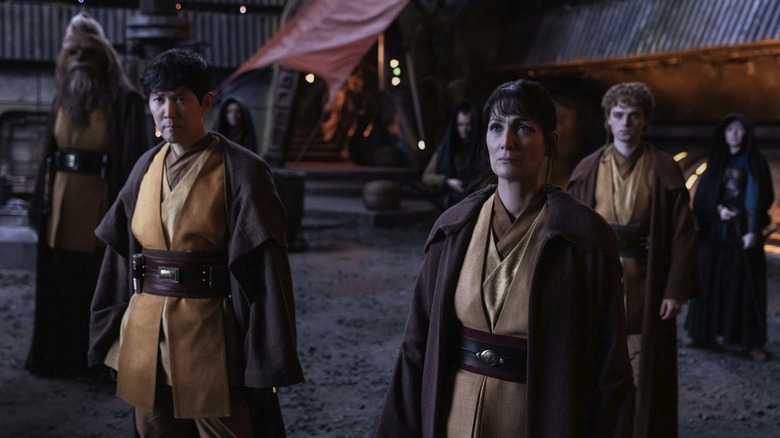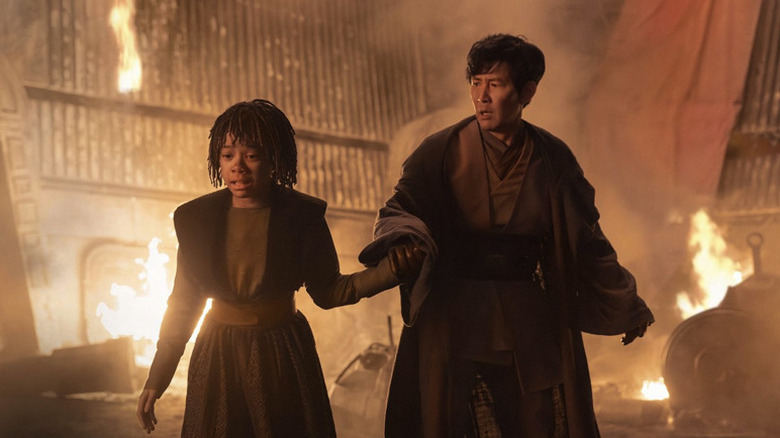The Acolyte's Rotten Tomatoes Audience Score Brings Out The Star Wars Fandom's Dark Side
Well, it's happened again. A high-profile franchise project starring women, members of the LGBTQIA community, and/or POC has been review-bombed by audiences on Rotten Tomatoes, with the most vocally intolerant corners of a sprawling fandom making their voices heard loud and clear.
"Star Wars: The Acolyte" is the latest project on the receiving end of this tactic, with the show's audience score having fallen to 14% as of this writing. (By comparison, its score with critics is 84%.) At this point, as only the fifth sentence of this article begins to unspool, I imagine a lot of fans are already bracing themselves, ready and waiting to wade into a discussion that's been happening in some form or fashion for a decade at this point. "Hey," they'll say, "I just genuinely think this show/movie sucks, OK? Don't lump me in with racists and misogynists who go out of their way to give projects like this one star just for the lolz."
Over the past decade or so, this has happened with more projects than I can remember. 2016's "Ghostbusters." "Star Wars: The Last Jedi." Marvel's "Black Panther." Billy Eichner's gay rom-com "Bros." "The Lord of the Rings: The Rings of Power." HBO's "Watchmen." The list goes on, but one of the most drastic cases was for Marvel's "Captain Marvel," and the campaign against the film was so strong, it caused Rotten Tomatoes to overhaul the way the audience score functions on the site. Before that point, any user could leave a review at any time. Now, only users who verify that they've purchased a ticket through RT's parent company Fandango can leave reviews that count toward the "verified ratings" audience score, which is prioritized over an "all audiences" option that takes a little more work to locate on the site. But that verified methodology only applies to movies, where purchasing a ticket is a requirement. For TV shows, all bets are off.
The Acolyte is admittedly not great, but it doesn't deserve this
Here's the thing: I'm not even a huge fan of "The Acolyte."
"The Acolyte" creator Leslye Headland is the co-creator of Netflix's "Russian Doll" and the writer/director of films like "Bachelorette" and "Sleeping With Other People." Broadly speaking, I like her work quite a bit. She directed the first two episodes of "The Acolyte," and as someone who has largely tapped out of all things "Star Wars" in recent years with the exception of the excellent "Andor" (I never watched the animated stuff and the prequels aren't really my jam, so I'm not personally interested in Dave Filoni's vision for "Star Wars"), I found plenty to like about the first two episodes of this show. I thought it had a lot of promise heading into the rest of its season. You can listen to a whole podcast we did about it here:
I've also historically been a big fan of Kogonada, whose feature films include the low-key indies "Columbus" and "After Yang." He directed the third episode of "The Acolyte," but unfortunately, this is where my interest in the series fell off a cliff. With no disrespect intended to the people who surely worked hard on this production, I personally found this episode of TV to be stylistically inert, poorly performed, and narratively uninteresting.
Obviously, all art is subjective, and while I don't have the time or the inclination to dig into Rotten Tomatoes' system and definitively prove that some users have purposefully tanked the score here, a 14% Rotten Tomatoes audience score for this series is too extreme to pass without comment. (It also seems clear that at least some of these folks are doing this in bad faith, given that a completely unrelated movie from 2008 called "Acolytes" has also apparently seen a precipitous drop in its RT audience score.)
This is yet another reason not to care about Rotten Tomatoes scores
Normally, I would shrug my shoulders about this whole situation and move on with my day. But despite /Film's best efforts to constantly point out how flawed Rotten Tomatoes is as an institution, with its frequently misunderstood critics score and the fact that it was hacked and some of its scores have been artificially manipulated, it has taken hold in society to such a degree that casual viewers still use it as last line of quality when deciding whether to watch something. And when a score has been this obviously manipulated, it rubs me the wrong way.
Most people don't spend their free time tracking stuff like this online. They have jobs and lives and families and other things to deal with all day, so when they plop down on the couch, think about giving a new show or movie a try, head to Rotten Tomatoes, and recoil when they see a low audience score number, I imagine they don't go that extra step of researching whether or not that number accurately reflects the "real" opinions of all of these users. They just move on to something else.
All of this is, once again, a key reason not to use a Rotten Tomatoes score as your sole barometer when judging whether you should watch a movie or show. Believe me, I sympathize with the desire to cull through the myriad number of viewing options available at any given time and look at a couple of numbers on a website to determine whether they will match your specific taste. But that's not how art should work. And I understand that feeling of not wanting to waste time watching something you don't end up liking when there are so many good options out there. But my recommendation (which I realize no one is directly asking for, but which I'll provide anyway because it's my job) is to get back to taking chances on movies and TV shows again. Remember renting something from Blockbuster you'd never heard of based on its box art and maybe a star or two who were in it? There was an excitement in that process, an "anything could happen" feeling of discovery that has been sucked out of most of our viewing experiences in 2024, when the mighty algorithm rules all.
Next time you're interested in something, don't look at the Rotten Tomatoes score. If it's bad, you can always bail and move on to something else. But take the power of choice back, and see what delights might await you.


